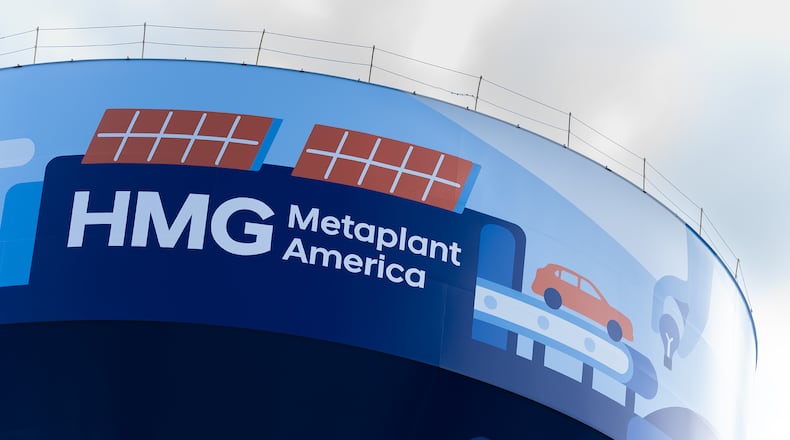The Hyundai electric vehicle plant is open in Bryan County, and state environmental officials on Monday cleared the way for the drilling of four wells in neighboring Bulloch County to supply water to the sprawling factory and surrounding development.
The Georgia Environmental Protection Division approved withdrawal permits for 6.625 million gallons per day from the Floridan aquifer. Hyundai expects to use as much as 4 million gallons from the wells daily at its almost 3,000-acre manufacturing facility campus.
The permits were issued even as the U.S. Army Corps of Engineers is reevaluating a previously approved wetlands permit for the site. The review is directly related to the impact of the factory on the area’s water supply, and the federal regulator has requested information about the short-term and long-term water supply plans from economic development officials who have steered the development of the property.
Hyundai began assembling customer vehicles last week after several months of building test cars. The Korean automaker will gradually increase its production — and the size of its workforce — and the first two wells are expected to be online in the second quarter of 2025. Permitting, site preparation and equipment acquisition for the two wells have been underway for several months with construction to start in the “immediate future,” according to an economic development spokeswoman.
Credit: Stephen B. Morton for The Atlanta Journal Constitution
Credit: Stephen B. Morton for The Atlanta Journal Constitution
The approval of the permits was welcomed by officials with the Savannah Harbor-Interstate 16 Corridor Joint Development Authority, also known as the Savannah JDA. The four-county consortium of economic development agencies collaborated with the Georgia Department of Economic Development to develop and market the property now home to the Hyundai factory.
“We thank the Georgia EPD for its rigorous analysis of the impact this development will have on the area’s water supply,” read a statement from the Savannah JDA. “After thoroughly reviewing the science and considering all input from the community, the Georgia EPD concluded that the four wells can meet the interim water needs.”
The wells are meant as a stopgap water supply for the EV plant, with the permits stipulating that Bryan County construct and operate an alternative source within 25 years. Economic development officials are currently exploring options, which include surface water from the Savannah River and its tributaries.
The wells are to be drilled in Bulloch because the Hyundai plant sits close enough to Savannah to be subject to aquifer withdrawal restrictions related to a decades-old legal dispute. The same limits do not apply in Bulloch, located farther inland, and economic development officials have long planned to drill wells in the rural county and pipe water about 5 miles east of the factory.
The Hyundai property, known as the Bryan County megasite, was first marketed to large-scale manufacturers in 2014. Hyundai agreed to build its plant there in May 2022 and broke ground on the facility five months later. At the same time, the Bryan and Bulloch county governments were negotiating a water sharing agreement and applying for the well permits.
The wells are opposed by many Bulloch residents who live near the drilling sites, including farmers who tap into the aquifer to irrigate crops. Their concerns revolve around fears that the additional withdrawals could lower the water table in the aquifer below the level of their well systems. The average agricultural well reaches more than 40 feet into the aquifer’s depths.
Studies by EPD scientists estimate the new wells will lower the water table in the Floridan aquifer, an 82,000-square-mile underground reservoir that holds billions of gallons of freshwater, by a maximum of 19 feet.
Credit: Adam Van Brimmer/AJC
Credit: Adam Van Brimmer/AJC
Opponents are skeptical, citing EPD is a state agency with leadership appointed by the governor. Gov. Brian Kemp has championed the Hyundai plant, the largest economic development project in Georgia’s history and a pillar of his agenda to make the state a hub for green manufacturing.
“This is a result of political pressure from the top government in Georgia. It is ignoring the voice of the people,” said Lawton Sack, leader of the Bulloch Action Coalition, a citizen activists group. “There have been numerous independent scientists who have what the EPD has been saying. Our commissioners in Bulloch County have sold us out.”
The Bulloch Action Coalition, which counts several commissioners-elect to the Bulloch County government among its members, is in the midst of a petition campaign aimed at repealing the water sharing agreements. Organizers hope to gather 5,000 signatures from registered Bulloch voters, enough to call for ballot referendums allowed under the citizens’ referendum clause of the Georgia Constitution.
A similar initiative led to a 2022 vote in Camden County that blocked a proposed spaceport.
Sack said the effects of two recent tropical storms, Debby and Helene, have forced the Bulloch Action Coalition to ease back on collecting signatures. They have more than 2,000 signatories and had targeted Oct. 31 as a goal to submit the petitions.
“Our commitment to the referendums remains strong,” Sack said. “We believe there’s still time to make a difference.”
About the Author
Keep Reading
The Latest
Featured




